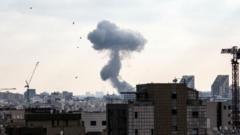In the wake of recent airstrikes on Iranian nuclear sites, families of service members express deep concern over the safety of troops as tensions escalate.
Rising Tensions: Military Families Face Uncertainty After Airstrikes

Rising Tensions: Military Families Face Uncertainty After Airstrikes
Concerns grow among U.S. military families following recent airstrikes in Iran, reflecting mixed emotions about troop safety.
This past weekend at Fort Benning, Georgia, military families gathered under a cloud of uncertainty as recent airstrikes in Iran heightened anxieties about the safety of U.S. service members. With new Army recruits graduating just as President Trump sanctioned military strikes against Iranian nuclear installations, sentiments ran high—ranging from support to fear.
Michele Bixby, a 24-year-old from New York whose brother recently completed his basic training, expressed her worry: “People can lose their life, so I’m worried. But it’s what he wanted to do; it’s what he loves to do.”
After the administration confirmed the airstrikes, community reactions within military circles varied widely; yet, one common thread emerged: overwhelming concern for troops deployed overseas. Secretary of Defense Pete Hegseth reassured the public that the U.S. was not seeking an open-ended conflict in the region, but the threat of retaliation from Iranian forces looms large. Many installations across the Middle East house over 40,000 active-duty personnel.
“The reality is setting in for many families that this situation poses a genuine threat,” said Meghan Gilles, 37, who works with the Army Reserve at Fort Campbell in Kentucky. As military families come to terms with their loved ones’ roles in an increasingly volatile global landscape, the rising tension ignites both pride and apprehension within them.





















